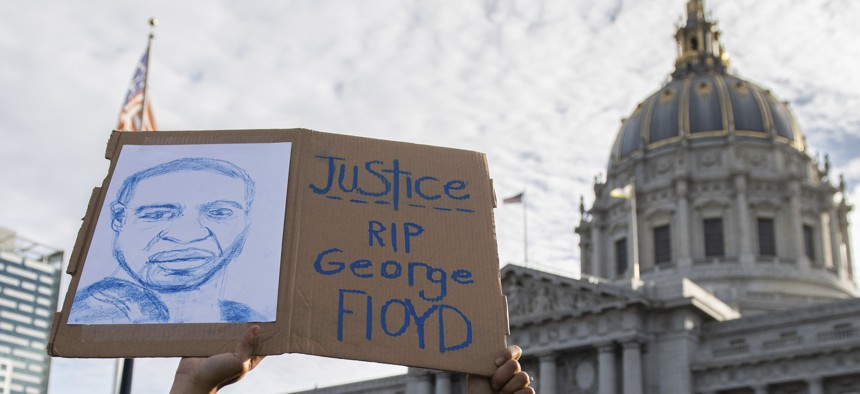Will George Floyd’s Death Actually Change How Cities and States Are Run?

A sign is held up outside of San Francisco City Hall during a protest over the death of George Floyd in police custody. AP PHOTO/Chris Tuite
COMMENTARY | Institutionalized racism has been an existential threat to the black community for centuries. In the aftermath of George Floyd’s death, it’s up to state and local leaders to usher in badly needed systemwide reform to end racial injustices.
On May 25th, George Floyd, an unarmed black man was killed by white Minneapolis police officer. How many times has a sentence been written? If you answered too many, then you’re right.
The recent deaths of George Floyd, Ahmaud Arbery, Breonna Taylor, Tony McDade and countless others are the visible manifestation of what black Americans have known for generations: that racism is encoded into the DNA of the country and has created a pervasive culture of legal, institutionalized practices that have severely undervalued black lives by treating them as expendable.
These deaths are shocking and yet they aren’t. Rather, they feel too familiar and remind us of the other black lives ended by the police, like Philando Castile near Minneapolis, Michael Brown in Ferguson, Missouri, Eric Garner in New York City and Tamir Rice in Cleveland. It reminds me of when police officers shot Amadou Diallo 41 times in the Bronx, New York in 1999—the first police shooting of an unarmed black man I was able to consciously comprehend.
Many have speculated that this time is different. That might be true. But there’s really only one way for Floyd’s death to be different than the ones that came before: actual consequences.
The most obvious response is for there to be consequences within law enforcement. The deaths that proceeded Floyd’s all have a troubling common theme: the officers involved faced little to no legal repercussions for their actions. According to the Mapping Police Violence project, 99% of police killings from 2013-2019 didn’t result in the officers involved being charged with a crime. And when they are charged, they are rarely convicted. Officers often can’t even be held personally liable in a civil suit thanks to the legal doctrine of qualified immunity, which has protected officers, and the cities that employ them, from being sued for excessive force.
For this time to be different, there must be consequences. Consequences for the officers involved in the form of convictions. Consequences for police departments by banning tactics like chokeholds and no-knock warrants. While these are important actions—if for no other reason than to show that law enforcement isn’t above the law it’s sworn to protect—they still aren’t addressing the core issue.
Law enforcement didn’t create racism in America. It’s a result of it. Said differently, solely focusing on police reform amounts to addressing the symptoms of racism, but not the disease itself. That isn’t enough.
Government has for generations consciously and unconsciously embedded racism into laws, policies and programs. The only consequence that will truly signify that Floyd’s death is different is if officials in governments across the country embrace radical reform that looks beyond the obvious and tackles the underlying conditions that have brought us here.
Much like a home remodel, we must expose the beams and joists that have allowed racism to promulgate and completely overhaul it so that black citizens finally experience the full rights and privileges of American citizenship. And the most meaningful reimagining of government must take place at the state and municipal levels.
State and local governments have arguably played the most influential role in letting the disease of racism go unchecked. It was state and local governments that delayed or flat out denied the desegregation of schools after the landmark Brown v. Board of Education Supreme Court decision. It was cities that created exclusionary zoning practices that required certain neighborhoods to consist only of single-family homes or created minimum lot sizes, making it difficult for black residents with limited wealth to obtain housing. And it’s state and local governments that have continued to dispatch the criminal justice system to handle societal conditions like homelessness, addiction and mental health.
State and local governments are long overdue to publicly acknowledge, apologize and end their complicit role in perpetuating systemic racial injustices.
But a systemic problem demands a systemic solution. A piecemeal, department by department, approach won’t work. The circumstances that have led black citizens to be 60% more likely to be uninsured, three times more likely to not enough food and accumulate only one-tenth of the wealth of white Americans are all intertwined.
You can’t address the massive hurdles for black citizens to accumulate wealth without addressing access to affordable housing. You can’t address the overrepresentation of black men and women who are incarcerated without addressing school zero tolerance policies that created the school to prison pipeline. And you can’t address health inequities that have led to black Americans being three times as likely to die from coronavirus without addressing persistently higher unemployment rates for black workers.
If state and local governments are going to reinvent themselves, they have to stop addressing issues in silos and start delivering services that focus on the intersection of issues. That means not just calling for police reform, but reforming education, economic development and so on.
Changing government’s approach isn’t going to be easy, but it’s probably never been more necessary. The current budget crisis facing states, cities and counties due to the coronavirus can seem like an impediment, but it also creates the opening to upend the status quo.
The murder of Emmet Till in 1955 is widely considered to be a catalyst for the civil rights movement. Now, 65 years later, George Floyd’s death is poised to be a watershed moment that finally forces state and local governments to reckon with their past and begin to root out the institutionalized racism it helped build.
Alisha Powell Gillis is the senior editor for Route Fifty.
NEXT STORY: Cities Reconsider Tear Gas Use in Protests






